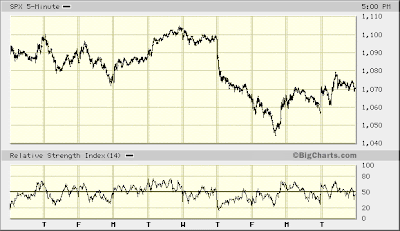Dow Theorist newsletter publisher Richard Russell believes the Dow Jones Industrials Average is poised to retest its March '09 lows. Shocking! Not.
Of course, disbelief not unlike that heaped on those who called NASDAQ a bubble in early 2000 greets this sort of forecast. So, what should one make of this?
What? After a decade spent going nowhere? Uh, duh! This sort of denial is mentality one should expect prior to collapse, pure and simple.
According to Seymour and Terranova the "fundamentals" do not bear out Mr. Russell's outlook. Really!
Are you kidding? A major currency block (the Euro zone) is on the verge of blowing out — an event absolutely dwarfing the sub-prime mortgage crisis — and "fundamentals" are bullish?
To the likes one should ask: who are you, and what have you done with planet earth!
Such is life, I suppose, when the Walt Disney Company is a member of the Dow Jones Industrials Average...
"Joe Terranova, you just bought JPM because you say it has the best balance sheet of all financials! What are you gonna do now?"
Go to Disney, Joe. There's a dog there named "Goofy" you should run that analysis by.

It does not appear the forecast "bottom" prior to "bounce" preceding "collapse" is forthcoming. Bottom instead apparently came last Friday.
Yet in the move to bottom coincident RSI possesses all the character of a third wave. This might mean the anticipated bounce has gone about as far as it will ... at least for now.
But is the "bounce" over? Or could consolidation of losses delivered thus far continue, say, to February options expiration?
That's possible. A sideways trade in a narrow range resulting in confusion over what lies ahead (whereas continued weakness presently seems more universally acknowledged) could develop over the coming week or so.

* * * * *
© The Risk Averse Alert — Advocating a patient, disciplined approach to stock market investing. Overriding objective is limiting financial risk. Minimizing investment capital loss is a priority.
Analysis centers on the stock market's path of least resistance. Long-term, this drives a simple strategy for safely investing a 401(k) for maximum profit. Intermediate-term, investing with stock index tracking-ETFs (both their long and short varieties) is advanced. Short-term, stock index options occasionally offer extraordinary profit opportunities when the stock market is moving along its projected path.
Nothing is set in stone. Nor is the stock market's path of least resistance always known. More often than not, there are no stock index option positions recommended.
 There's an easy way to boost your investment discipline...
There's an easy way to boost your investment discipline...Get Real-Time Trade Notification!




















6 comments:
Care to comment on this little nugget I found:
The Investors Intelligence poll just came out for last week and showed the bull camp dwindling to a 34.1% share from 38.9%; and the bear share up, to 26.2% from 22.2%. Those believing we are entering a true corrective phase is now 39.8% of the survey population — highest reading in 27 years..
When nearly 40% of people expect a correction, I'd bet the other way.
Why not comment on other things that might actually prove useful like gold, oil, silver, agriculture, bonds, or currencies. You've been fighting this equity bull market for the past 8-months, why not try your Elliot Wave hocus pocus on a different product/asset class and you might have more success...
Keep up the good work, the site is highly entertaining. I especially like posts where you disparage the mainstream media juxtaposed with others that have links to "Fast Money"! Does that qualify as irony?
-EBITDA
Yeah, I'm betting the other way, too, EBITDA. I expect the market to collapse and challenge March '09 lows, however ... the sort of thing to shake those expecting "correction" (the likes of which who in truth generally remain bullish) and move them right into the bear camp ... precisely at the moment when "correction" (back up) probably will be the better outlook.
Per commentary on other asset markets using the Elliott Wave Principle, if there were 124 hours in a day, I'd think about it. Then again, why bother? Stocks are where the money's at ... at least most of the time. Now just happens to be not one of them.
Thanks for your complement -- I entertain myself as well!
Really, that's where the money is? Were you not the same person who condescendingly told me that the currency and fixed income markets dwarfed the equity markets?
Entertaining indeed.
"That's where the money is" ... as in the stock market offers superior historic performance relative to other asset classes.
And yet, too ... that's where the money is about to exit because those other, larger markets are increasingly coming under attack as private financier interests ratchet up their war against sovereign nation states.
Sorry you perceived as being condescending my response some weeks ago pointing out the considerably larger size of debt markets. When you presented your valuation metrics as though these supersede all other factors institutional money managers base their decisions on I simply thought you were overdosing on CNBC and might not be aware equity markets are dwarfed in size by debt markets.
I never overdose on CNBC because I rarely listen to what any talking head on CNBC spouts off about. Best to keep that channel muted.
As to your claim of relative out-performance of equities... I suppose it depends on one's holding period. (ignoring for a moment the humor in you lecturing me on the relative merits of equity). There hare been plenty of periods where government bonds have beaten equities. There are other times when High Yield bonds or Gold have beaten equities. Over short & intermediate time periods sometimes these return differentials have been massive. How much would an investor in gold (circa the year 2000-2) have beaten the S&P 500 over that 10yr period?
My point is only US equities are but a small sliver of the things an investor can invest in -- even if your only investment is your 401k (Emerging markets, Foreign Stocks, Foreign Bonds, Corporate Bonds, etc).
Furthermore, stepping further away from the equity markets. If you're so concerned about the fragility of the European Union, why not recommend your readers go short anything involving the Euro? Shorting the EUR/JPY, EUR/USD, or even Eur/AUD or GBP would have yielded fantastic results over the last several weeks (on an unlevered basis).
Perhaps I'm being a bit too worldly but if a reader is truly "risk averse" would you want to keep your cash in greenbacks earning 0-1.25% when inflation is closer to 2% or above? That doesn't seem like a very safe place to keep your money.
Anyway, enjoy your weekend.
No doubt there are periods when other asset classes outperform equities. Yet my intention here strictly is to do with commenting on perceived prospects in the U.S. stock market. If my remarks should include matters affecting debt markets as these are being impacted by some disturbance or another, then my thoughts on such things largely are given for the sake of spicing up stock market related commentary whose conclusions otherwise are driven by technical considerations.
Given generally limited investment choices available in a typical 401(k), unavoidable is the risk of enduring periods when parking savings in a money market fund could result in an inflation-adjusted loss over the interim. Yet over the duration of one's lifetime I believe one can expect that, during periods when relatively low-risk opportunity becomes present in the stock market, inflation-driven losses suffered while protecting principal in a money market fund likely will be recovered and some. This, of course, assumes one is willing to risk capital in the stock market at any age one might be -- a matter of strategic practice I in fact advocate, because opportunity and risk in the stock market know no age. Of course, this matter of practice assumes opportunity and risk in the stock market are reasonably predictable. I would not be commenting on the market's prospects were I one who believed otherwise.
Post a Comment